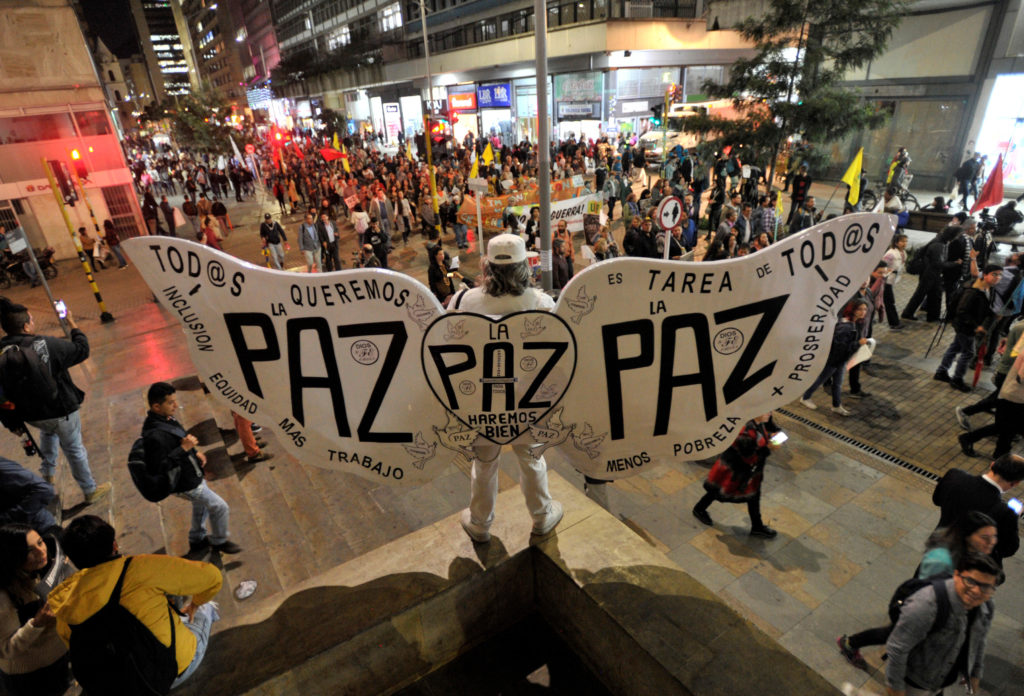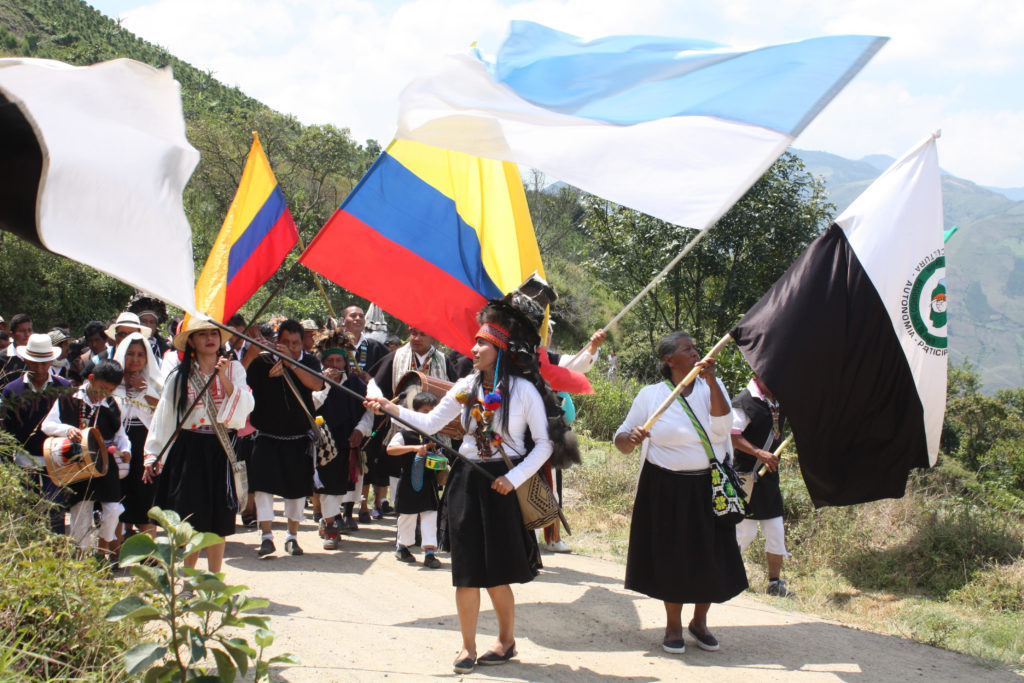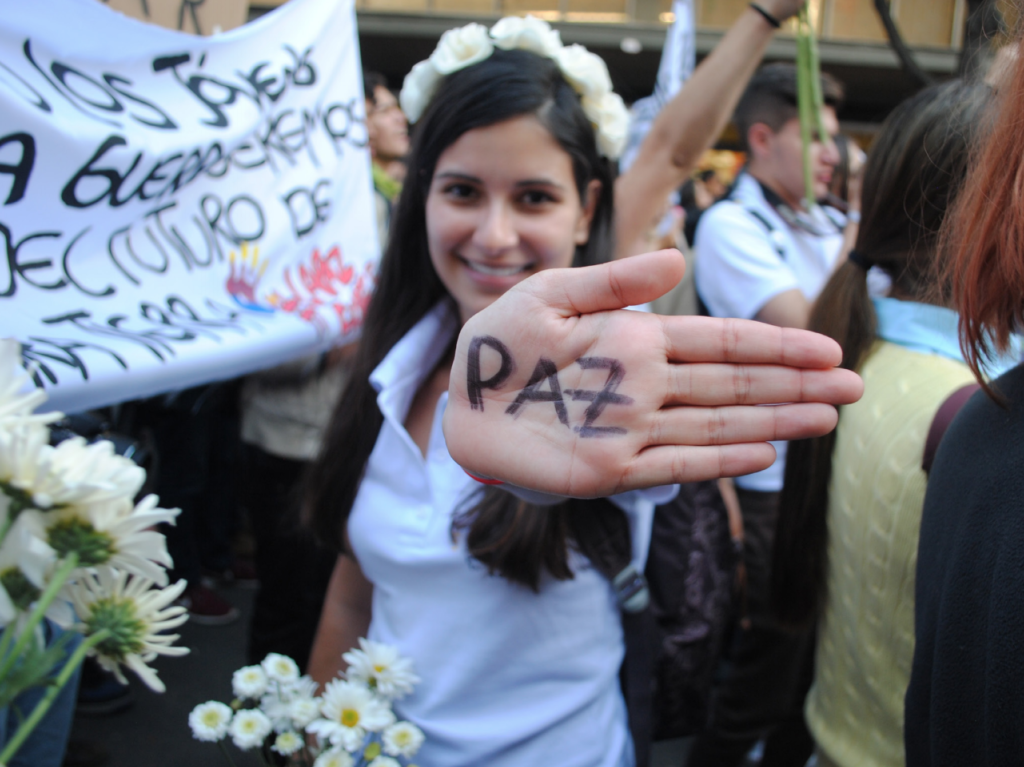Colombia
Colombia es el ejemplo más reciente y ambicioso de las últimas décadas de un esfuerzo para ponerle fin de manera negociada a un conflicto armado. Su diseño riguroso, su mirada cuidadosa a lecciones aprendidas de otros procesos a nivel nacional e internacional, y las grandes transformaciones que planteó han convertido a este proceso en laboratorio y referente mundial en materia de negociación, dejación de armas, construcción de paz, justicia transicional, y más.

IFIT ha acompañado de primera mano esa experiencia casi desde su inicio.
En 2012, IFIT intervino como experto presentando una argumentación clave ante la Corte Constitucional para darle fuerza al concepto de la importancia de la participación política de los excombatientes de las FARC. Posteriormente, en La Habana, IFIT acompañó como experto todas las discusiones y definiciones que llevaron, luego de año y medio, a la creación del Sistema Integral de Justicia, Verdad, Reparación y No Repetición.
Así, IFIT modeló la idea de que todo el conocimiento de cuatro años de negociación, debates, investigaciones y formulaciones no podía perderse al momento de dar inicio a la implementación del Acuerdo de Paz. Para ello, creó el grupo experto Fondo de Capital Humano, compuesto por quienes estuvieron presentes de primera mano en la negociación y redacción del Acuerdo. De ahí surgen experiencias que son vitales para la implementación y la transición en Colombia, pero también, para la oportunidad de que otras naciones escojan salidas negociadas a sus conflictos. IFIT, como ninguna otra organización, ha procurado que esta información esté disponible y sea compartida con Colombia y con el mundo, y ha documentado detalladamente y llevado esta experiencia, las lecciones y los aprendizajes a una multidud de países.
En Colombia, la experticia y el enfoque de trabajo de IFIT también ha permitido para muchos efectos pasar por encima del obstáculo que genera la polarización y dialogar con todos los sectores sobre la visión de lo que puede ser la paz para el país; resolver problemas prácticos y jurídicos de la puesta en marcha de ese ambicioso Sistema de justicia transicional y así facilitar su funcionamiento; y publicar dos libros sobre la fase exploratoria y la fase pública que son hoy los referentes más importantes de académicos y líderes de opinión sobre los detalles de esta negociación.
La experiencia de Colombia y su trabajo de los últimos años también le permitió a IFIT poner en marcha en 2020 el Fondo Territorial de Capital Humano, un grupo que reúne importantes líderes de diferentes regiones del país y que le ha permitido adentrarse de manera única en lo local, vincular regiones muy diversas de Colombia entre sí, conectar tomadores de decisión del nivel nacional con el territorial, y incidir de manera directa en aquellos lugares que pueden ser los más determinantes para la repetición del conflicto o para la construcción de paz.
Grupos de expertos en Colombia

Fondo de Capital Humano
El Fondo de Capital Humano (FCH) es un grupo de expertos multidisciplinario compuesto por dieciséis colombianos que desempeñaron un papel directo en las negociaciones en La Habana, han participado en procesos anteriores de construcción de paz en el país y hoy siguen trabajando en ello desde distintos sectores. El FCH tiene como objetivo garantizar que la riqueza de los conocimientos adquiridos durante las negociaciones en La Habana permanezcan disponibles y organizados durante el periodo de la implementación del Acuerdo con miras a una transición exitosa, teniendo en cuenta los obstáculos y desafíos que pueden surgir. Con el apoyo de IFIT, estos expertos se reúnen regularmente para discutir sobre temas relacionados con la construcción de una paz duradera. Con base en estas discusiones, junto con IFIT, se producen insumos de análisis para aumentar la conciencia pública sobre oportunidades, riesgos u otros aspectos de la transición colombiana poco examinados; se visibilizan las preocupaciones y propuestas de los distintos sectores; y a través de espacios de intercambio de ideas, se ofrecen soluciones y alternativas para quienes tienen la responsabilidad de tomar las decisiones en estos temas. Desde 2020, el trabajo de este grupo se complementa con el del Fondo Territorial.

Fondo Territorial de Capital Humano
El Fondo Territorial de Capital Humano (FTCH) es un grupo compuesto por 11 reconocidos expertos que habitan y trabajan en la implementación del Acuerdo de Paz en regiones de Colombia particularmente vulnerables y claves para la estabilidad de la transición. A raíz del impacto y el espacio ganado en este tema por el Fondo de Capital Humano (FCH) desde 2016, y con el fin de dotar este trabajo de un intercambio de experticias entre la perspectiva nacional y territorial, IFIT creó en 2020 este grupo de expertos territorial. Sus miembros complementan el trabajo de IFIT y el FCH y permiten asegurar que las aproximaciones y las propuestas a actores clave y tomadores de decisión sean realistas y estén debidamente contextualizadas. Los miembros de este grupo se benefician además del intercambio de lecciones aprendidas entre ellos y con otros actores a nivel nacional e internacional, y tienen acceso al conocimiento técnico de la red global de expertos de IFIT.
You may also be interested in

Public Commentary / 28 April 2020
Los municipios que enfrentan el virus y luchan contra la violencia

Public Commentary / 25 January 2019
Enfrentar al Eln sin darle un portazo a la paz


